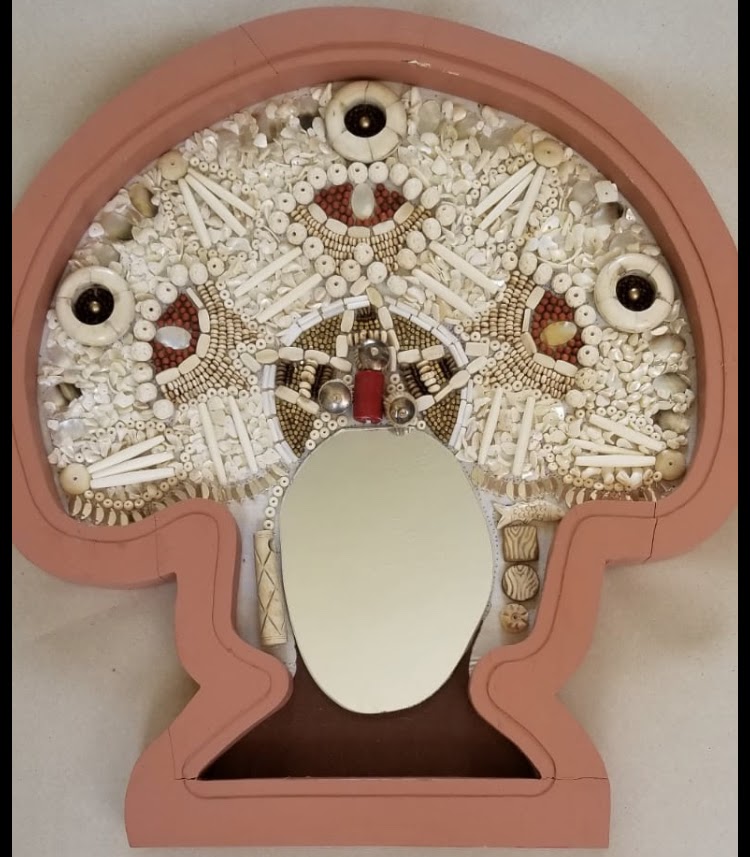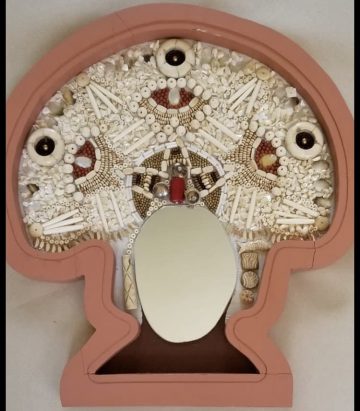Guest Post by McArthur Krishna, McArthur comes from a pack of storytellers. And while the pack rightly insists she’s only in the running for third-best storyteller on a good day, she’s made her living in stories. Stories in words and visual art that inspire, demand, encourage and cajole us along this wild ride of life. If you know her, she will unabashedly tell your stories too (with some degree of truthiness). Look out.
This is the first of a seven-part series about why Heavenly Mother is essential.
Part 2, Part 3, Part 4, Part 5, Part 6, Part 7
I write books and make art about Heavenly Mother. When I tell people this, they often come back with three immediate reactions. We’ll tackle them one by one in this post.
First, almost all of us were taught the idea of the “sacred silence’ around Heavenly Mother— the concept that we were not to speak of her as she was too delicate or protected by our Father in Heaven. Frankly, this one is easily managed. In my assessment, if the Church has a gospel topics essay entitled Mother in Heaven, the world wide web is about as public as you can get. Clearly, we can speak of Her. The survey in A Mother There that clarifies no prophet or apostle has ever told us we cannot. It was cultural hogwash that got us here… which is good news. If we did it to ourselves, we can undo it.
The second reaction I hear is that there simply isn’t enough information about our Heavenly Mother to talk about. There are two parts that I consider with this concern:
- I actually think there is a lot more than what people think: plenty enough for my co-author Bethany and I to write the Girls Guide to Heavenly Mother and the Boys Guide to Heavenly Mother based only on quotes by prophets, apostles and female church leaders. The A Mother There article cites an additional six hundred references to Her. Not all of those are from trusted sources but it absolutely makes the case that Heavenly Mother was discussed. There is a journal entry recording a story of Joseph Smith using the existence of Heavenly Mother to comfort someone. There are scholarly pieces that lay out cases for Heavenly Mother in the scriptures and a lot of scriptures that describe god as female. A few examples: “You were mindful of the Rock that bore you,” Deuteronomy 32:18, or “Can a woman forget her nursing child, or show no compassion for the child of her womb? Even these may forget, yet I will not forget you.” 1 Nephi 21:15. I hear more and more of people who have rich and robust spiritual experiences with Her. I recommend the website SeekingHeavenlyMother.com to find a range of sources.
- The second thought I have on “not enough information” is, “THANK GOODNESS.” When I was recently reading about race in our church history, I came across quotes that were painful to my soul. The great thing about there being less about Heavenly Mother also means there is less correlating muck. Almost everything I have read that apostles and prophets have said of Her has been uplifting, expansive, and ennobling. That is something of true value.
The third reaction, if people get past the taboo and the lack of information, is that we don’t need to bother with Heavenly Mother because she is not essential. This is the one that concerns me the most because it indicates a deep lack of respect for the order of the universe and the role of women. If the mother to the Savior isn’t essential, then we aren’t either.
My art piece for the recent show “Reflections on Heavenly Mother” with Certain Women was entitled ELEMENTAL. Here’s what this piece mean to me:

Our Heavenly Mother is elemental. She is the basics of bone and wood and shell and shine. And so are all of us. We are reflected in our Heavenly Mother’s image. And though we may be battered and imperfect in our progression, we are still essential. Like Her.
Essential Fact #1: Heavenly Mother is the Mother of our Souls
Of all the characteristics of Heavenly Mother, this is probably the least controversial: Heavenly Mother is the mother of our souls. This has been stated by numerous prophets, general authorities, and female church leaders. To quote a few:
Prophet Russell M. Nelson, Perfection Pending, October 1995
“This divine entreaty is consistent with the fact that, as begotten children of heavenly parents, we are endowed with the potential to become like them, just as mortal children may become like their mortal parents.”
“We are the literal spirit children of divine, immortal, and omnipotent Heavenly Parents.”
Elder Dieter F. Uchtdorf, O How Great the Plan of Our God! October 2016
Julie B. Beck, Young Women General Presidency, You Have a Noble Birthright, April 2006
“You have light because you are literally spirit daughters of Deity, ‘offspring of exalted parents’ with a divine nature and an eternal destiny. You received your first lessons in the world of spirits from your heavenly parents.”
President Bonnie H. Cordon, Young Women General President, Beloved Daughters, October 2019
“You are literally the spirit daughters of Heavenly Parents, and nothing can separate you from Their love and the love of your Savior.”
“Have you ever been told you are just like your mother, or you have your father’s smile, or all of your family have the same color of eyes? The physical characteristics that we inherit from our parents are obvious. The spiritual characteristics we inherit from our heavenly parents have to be developed. You have been born with all the godlike gifts that Christ has. They are within you, but you have to choose to cultivate and develop them. Spiritual growth doesn’t just happen without our best efforts.”
President Elaine L. Jack, Relief Society General President, Identity of a Young Woman, November 1989
But, what does this knowledge matter?
I have three daughters. My co-author has three daughters. We’ve talked to lots of women about where they are in life and the fact that we all need soul development. We decided to write A Girls Guide to Heavenly Mother partially for our tweens because they needed more information and more understanding of the universe and how it worked, but also because we regularly see that women don’t make choices to invest in their own souls.
I was speaking to a woman recently and she said, “I can’t go back and study. I want to go get this degree and I’m interested in this but I can’t go do this because there’s no return on investment. It doesn’t make sense financially to do this.” I thought about that, and thought, “You know, I take my daughter to soccer practice regularly and we invest in equipment and lessons and coaches and whatever NOT because I expect her to be a professional soccer player and to ever pay me back– but because I know it’s good for her to use her body and learn teamwork, etc.”
I believe in developing her soul.
Eva Whitesman said,”Our pursuit of knowledge has its own spiritual value regardless of whether we ever enter the paid labor force…Our learning is of value not only if we become mothers or workers, church leaders or community activists. We are of value because of our divine heritage and because of what will one day be our divine inheritance. Our value is not merely instrumental. It is intrinsic. Our learning is not merely instrumental. It is essential.”
Where did it come that women somehow quit thinking that our soul was worth this investment?
A few years ago I did a project on wise women in my life. One of these is a woman who taught me that her soul was worth investing in. What is amazing to me is that when she told me of her situation and choices, I was floored. My literal thought was, “Are you allowed to do that?” and then followed by a quick, “Duh.”
I know I forgot. Recently when my husband and I were planning the family budget we already had a line item for the expenses for our girls, and I looked at it and thought, “Wait. I need to embody what I have learned. I need a line item too!”
Soul development doesn’t have to be about money. A friend of mine recently called upon her family to support her so that one night a week she could hole up in her bedroom and paint. Another friend has a weekly “My Night”… where she can write or sleep or read or do whatever, where she gets to be a human developing her soul.
Both of these women fight off the guilt of taking time “away” from their family life. Guilt about doing exactly what we are suppose to be doing in this earth life: growing!
There are serious amounts of soul development that come from service and especially the intense service we render in our families. Soul development does not necessarily have to take us outside of our families. But as the painter friend told me, “I have strong muscles developed in one area of my life and total atrophy in almost every other.”

Knowledge of Heavenly Mother changes us. If we know that our destiny is heavenly motherhood that means that our souls—I won’t speak for you, but my soul—have to do a fair amount of development! There’s a gap between the state of my soul and the state of Heavenly Mother’s soul, like there’s a gap between being human and god. We have to continue to grow and develop. That’s what this whole earth life is about!
Women stall out or see their souls as not worth that kind of development. But however that looks like at the end of the day: time, energy, money, resources, using away guilt, etc, we have to understand our destinies as godhood. That means it’s going to take some vital soul development.
Sister Bingham said, “Our Heavenly Parents want us to succeed gloriously!” One of the most beautiful take-home messages about Heavenly Mother is having another all-powerful deity in my court who wants me to succeed, who is interested in nurturing my soul.
That’s all good.
Continued in Part 2.






10 Responses
Thank you for your work. I agree that valuing women, their worth, and eternal potential is impossible while ignoring Heavenly Mother. Heavenly Mother and Heavenly Father should be recognized and worshipped together.
Thank you, McArthur. I’m so appreciative of your work and look forward to more of this series!
I love your thoughts about investing in our souls.
[…] Part 1 […]
I believe that one reason mormon women are so desperate for a connection to the unseen divine woman is because we are forbidden any woman general authorities who speak for the divine with authority like Mormon men get to.
[…] Part 1, Part 2 […]
[…] Part 1, Part 2, Part 3 […]
[…] Part 1, Part 2, Part 3, Part 4 […]
[…] Part 1, Part 2, Part 3, Part 4, Part 5 […]
[…] Part 1, Part 2, Part 3, Part 4, Part 5, Part 6 […]